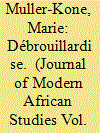|
|
|
Sort Order |
|
|
|
Items / Page
|
|
|
|
|
|
|
| Srl | Item |
| 1 |
ID:
146120


|
|
|
|
|
| Summary/Abstract |
Research carried out in two densely populated wards of Kampala in 2012 shows that food-insecure households dropped, or significantly decreased, their consumption of matoke, the plantain staple, soon after its availability declined and the market price rose. They shifted to a diet for which the base was a stiff maize porridge (posho), eating just one meal a day. Many such households were headed by grandparents, single grandmothers especially. For the full set of household heads interviewed (118), access to rural family land (kibanja) stood out as critical for achieving year-round urban food security. With few exceptions, households that farmed ‘at home’ – about half the sample – saw themselves as food secure. Access negotiations, however, could be difficult, especially for women. The growing number of grandparents responsible for raising grandchildren and nieces/nephews, many of whom were orphaned, has given rise to a new discourse whereby care is increasingly given to maternal grandchildren.
|
|
|
|
|
|
|
|
|
|
|
|
|
|
|
|
| 2 |
ID:
146117


|
|
|
|
|
| Summary/Abstract |
This article explores the relationship between transnational governance initiatives for ‘conflict-free’ certification in the eastern provinces of the Democratic Republic of the Congo (DRC) and the regulatory pluralism one finds on the ground. Efforts in certifying artisanal gold mining are scrutinised by analysing how three different gold mining sites in the DRC's South Kivu province are governed. Most artisanal mining in the DRC is usually referred to as ‘informal’ – a term associated with non-state actors. Instead, the article introduces the idea of a mode of governing that follows the principle of ‘débrouillardise’, which combines different rule systems and state and non-state regulators. It argues that ‘conflict-free’ governance will need to improvise via ad hoc agreements on the legal status of mining sites among state authorities, economic actors and international monitors. The act of declaring mining sites legal will provide for the semblance of a ‘conflict-free’ status and a unitary state system of rule, while in practice, the plurality of regulatory authority will not be reversed.
|
|
|
|
|
|
|
|
|
|
|
|
|
|
|
|
| 3 |
ID:
146119


|
|
|
|
|
| Summary/Abstract |
The Mozambican Land Law of 1997 intends to provide flexible rules of access to land, while securing local people's customary rights, as well as equal rights for women and men. Drawing on participant observation during a ‘land delimitation’ process in central Mozambique, this article analyses the complex negotiation ensuing from the implementation of the Land Law in a local community. It shows how the delimitation process provided spaces for asserting – male – roles of power and authority, while local women were increasingly marginalised in the process. By presenting oral testimonies from women in the community, the authors seek to balance the account, providing women's perspectives on the highly gendered character of interests in, access to, and exclusion from land. The analysis ends with the question: What would be required to provide a space for local women to articulate their interests in a secure access to land during the delimitation process itself?
|
|
|
|
|
|
|
|
|
|
|
|
|
|
|
|
| 4 |
ID:
146118


|
|
|
|
|
| Summary/Abstract |
This paper examines the impact of regional sanctions on the trajectory of the Burundian regime following the 1996 coup. Despite the country's socioeconomic and geopolitical vulnerability, the Buyoya government initially withstood the pressure from sanctions. Through a vocal campaign against these measures, the new government mitigated the embargo's economic consequences and partially re-established its international reputation. Paradoxically, this campaign planted the seed for long-term comprehensive political concessions. While previous literature has attributed the embargo's success to its economic impact, the government actually responded to the sanction senders' key demand to engage in unconditional, inclusive peace talks once the economy had already started to recover. Based on a novel framework for studying the signalling dimension of sanctions, I show how the regime's anti-sanctions campaign, with its emphasis on the government's willingness to engage in peace talks, backfired, with Buyoya forced to negotiate after having become entrapped in his own rhetoric.
|
|
|
|
|
|
|
|
|
|
|
|
|
|
|
|
|
|
|
|
|